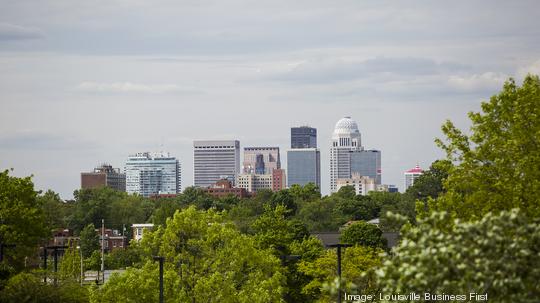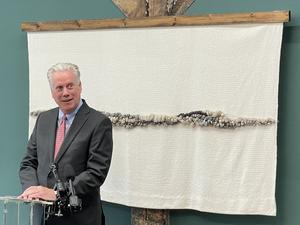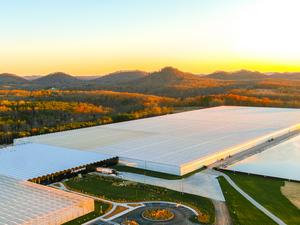
Two Kentucky metros are among the Midwest's top startup cities, according to a new analysis from Chicago VC firm M25.
Louisville is No. 13 this year, up one spot from last year prior, ranking high for both startup activity and cost of living. Lexington tied with Omaha, Nebraska, at No. 17, up nine spots.
Bowling Green, Kentucky, didn't make the top 20, coming in at No. 43. Covington, Kentucky, is included in the Cincinnati metro area, which came in at No. 10.
M25 compiled its rankings based on three factors: startup activity (active startups, startup formation growth, number of exits and large outcomes), access to resources (how much local startups have raised from VCs, the number of local investors, incubators/accelerators, universities, government support and access to quality talent) and business climate (cost of living, labor costs and business-tax friendliness).
Louisville performed fairly well when it came to startup density, momentum and exits, but didn't score well on access to resources because of its lack of Fortune 1000 companies and VCs firms. Lexington struggled with those same issues, but its workforce is more educated, with 29% of its population having at least a bachelor's degree, compared to Louisville's 16%.
The rise of remote work also led to smaller cities rising up the rankings as well, M25 Managing Partner Victor Gutwein told the Chicago Business Journal.
“We saw smaller communities like Bloomington, Lexington, Columbia — these more traditional college towns that have a good quality of life — really jumped up in the rankings this year, surpassing larger cities,” he said.
Still, the larger metropolitan areas remain best for scaling up operations.
Here are the top 20:
1. Chicago
2. Minneapolis
3. Indianapolis, Indiana
4. Pittsburgh
5. St. Louis
6. Columbus, Ohio
7. Detroit
8. Ann Arbor, Michigan
9. Madison, Wisconsin
10. Cincinnati
11. Kansas City, Missouri
12. Cleveland
13. Louisville, Kentucky
14. Milwaukee
15. Bloomington, Indiana
16. Lafayette, Indiana
17(tie). Omaha, Nebraska
17(tie). Lexington, Kentucky
19. Akron, Ohio
20. South Bend, Indiana
The biggest change occurred in the top four with Indianapolis overtaking Pittsburgh in the No. 3 spot for the first time since the list was started in 2017.
“The point difference was narrowing every year,” Gutwein said.
While Chicago has a “commanding lead” in the rankings year after year, it was more significant than ever in 2021.
The number of startups launched in Chicago has increased by 343 since 2017, a five-year growth rate of 40%. The city's startup momentum score — which shows the growth over the past five years in terms of the number of startups that are based in Chicago — reached 48.4 in this year's rankings, compared to 35.8 for Minneapolis, the No. 2 Midwest city.
There were 12 unicorns (companies with a $1 billion valuation or higher) created in Chicago in the 2021 calendar year, highlighted by companies like ActiveCampaign, Project44 and M1.
“That’s something no other city in the region can claim coming close to," Gutwein.
He said that cities like Columbus and Cincinnati may have had three unicorns a piece, but Chicago’s “depth chart” when it comes to the number of billion-dollar companies it houses remains “crazy impressive.”
“And it grew a lot last year,” Gutwein added. “To me, that’s a sign that it’s going to continue to grow for Chicago. For a long time I think it’s been overlooked, but with the amount of companies that have both exited and raised huge rounds here, it’s really a transformational city.”
In fact, launching a startup in the Midwest feels a little bit different today than it used to when the rankings first started thanks to Covid-19.
The pandemic brought with it a remote-centered world, and the challenges that used to exist for Midwest startups, like raising capital from the best investors across the country and accessing experienced talent, still exist to some degree but are largely mitigated.
“It was hard to get investors to come outside their core cities and commit more time, travel and money to something they aren’t connected with, and furthermore the experienced talent that’s worked in startups and seen a product go from seed stage to IPO has been lacking in the Midwest,” Gutwein said. “That’s been changing pretty fast because you can hire somebody to your team that isn’t necessarily based in Chicago and you can supplement what you can find locally with people on a national or international level.”
Finally, despite what appears to be a slowdown in venture funding, Gutwein was encouraged to see six new funds of $300 million launched in the last year.
“In the past, we’d be lucky to have one. We had six new family funds, mostly based in Chicago, and that means there’s a lot of capital,” he said. “There may be a bit of a slowdown right now, but there’s a lot of VCs ready to write checks.”
You can see the entire M25 ranking here.










